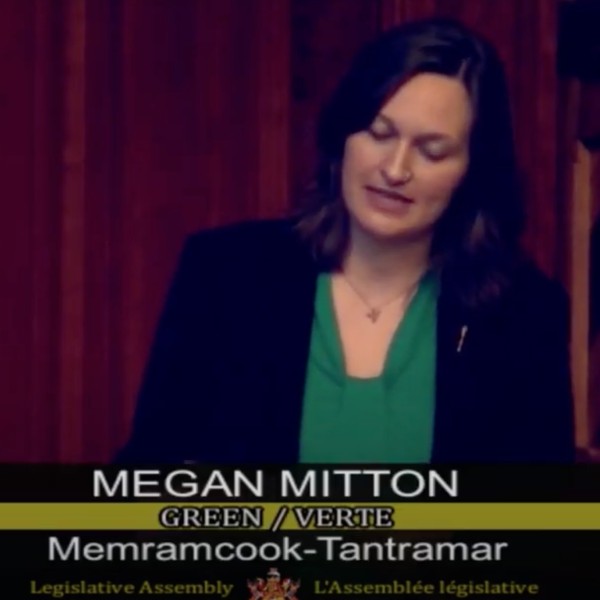
Patients and families struggling with symptoms of a neurodegenerative illness are calling for a new investigation into potential environmental causes of the condition.
Their demands come 13 months after the province announced that the “neurological syndrome of unknown cause” doesn’t exist.
The provincial Green Party held a news conference on Tuesday alongside people affected by the condition.
There are now 147 people “demonstrating a rapid onset of severe neurological symptoms,” according to the group. They said more than a third of those patients are under 45 years old.
Listen to the audio report:
Medical testing has shown that many of the patients were exposed to “multiple environmental toxins,” said Stacie Quigley Cormier, whose stepdaughter is among the patients.
In particular, she pointed to the herbicide glyphosate, which is widely used in forestry and agriculture.
“We want to confirm that in recent months, patients have tested positive for multiple environmental toxins, including glyphosate, with detectable levels between four and 40 times the average limit,” she told reporters.
Few details were immediately available, but she said “many patients have been tested.”
Her stepdaughter, former Mount Allison University student Gabrielle Cormier, is one of the youngest patients affected by what officials previously called a neurological syndrome of unknown cause.
Memramcook-Tantramar MLA Megan Mitton, the Green Party’s health critic, said the province must “remove all barriers” and allow federal health officials to investigate.
The group also called for federal Health Minister Jean-Yves Duclos to “unmuzzle federal scientists” and launch an investigation with federal experts.
They also accused the provincial and federal governments of “misrepresenting” their patient files in order to “abandon a public health inquiry.”
Later on Tuesday, Mitton raised the issue in the Legislative Assembly during Question Period, as patients and family members gathered in the visitor’s gallery.
Mitton cited a letter from Dr. Alier Marrero, the neurologist who first identified the contentious cluster.

“On January 30, Dr. Marrero once again raised his concerns about the unexpectedly high number of early onset or young onset progressive neurological syndromes in New Brunswick,” Mitton said.
“Will the Minister of Health get out of the way and allow the Public Health Agency of Canada to launch an investigation?”
Minister of Health Bruce Fitch said the department had received Marrero’s letter but denied “standing in the way” of an investigation.
“There’s a high degree of cooperation between New Brunswick Public Health and the Public Health Agency of Canada,” he said, and the federal agency “supported the results of the provincial investigation.”
“That is why the further investigation stopped, because the Public Health Agency of Canada agreed with the findings that were found here in the Province of New Brunswick.”
In response to a query from CHMA, the federal agency provided an emailed statement saying that it “provided support as requested by New Brunswick, throughout the investigation, until its conclusion.”
The federal health agency also “acknowledged the investigation’s findings that this cluster does not represent a neurological syndrome of unknown cause.”

Mount Allison University math and computer science professor Matthew Betti, a specialist in infectious disease modelling, is currently studying the syndrome.
On Tuesday, he monitored the news conference and gave CHMA an update about his research, which involves a survey of New Brunswickers.
So far, among respondents, the only ones showing symptoms appear to be from the Acadian Peninsula and around the northeastern part of New Brunswick, he said. “It’s hard to say there’s no connection.”
A study published by Public Health in October 2021 (PDF) concluded that “there are no specific behaviours, foods, or environmental exposures that can be identified as potential risk factors.”
Betti has criticized the study, noting, for example, that there was no control group allowing for comparison between patients and the wider population.
He also pointed to disturbing data from the Canadian Creutzfeldt-Jakob Disease Surveillance System (CJDSS), which is operated by the Public Health Agency of Canada.
Creutzfeldt-Jakob disease is a rare and deadly neurodegenerative disorder.
The CJDSS publishes a report annually detailing how many “candidate cases” have been brought to the organization’s attention, broken down by province.
“Even when you control for age… there’s still more candidate cases from New Brunswick, and that number has been increasing faster than other provinces,” Betti said.
Environmental factors such as glyphosate and blue-green algae are among the “top hypotheses” he’s grappling with as a researcher, he said.
The issue first came to public attention in March 2021 with the leak of a memo from Public Health to health care professionals.
It advised them about a cluster of more than 40 people with symptoms similar to Creutzfeldt-Jakob disease. The patients were concentrated around Moncton and near the Acadian peninsula.
But in February 2022, Public Health released a final report concluding that no cluster ever existed.
The report suggested there were multiple misdiagnoses, and that patients were likely suffering from conditions such as Alzheimer’s disease and post-concussions syndrome.
The patients’ group on Tuesday said many of those diagnoses had already been ruled out.
“We lost almost a year of our lives, only to be told to look for answers that we already had,” Stacie Quigley Cormier said. “It’s just smoke and mirrors.”
An in-depth report published by The Walrus magazine in October 2021 cited an anonymous source who said federal scientists had been “muzzled” at the request of the province.
In January, the news outlet CANADALAND reported that New Brunswick abruptly halted joint research between federal and provincial scientists “without explanation” in May 2021, citing internal government documents.
The so-called “mystery disease” has also made headlines internationally, with articles in publications including the Washington Post and The Guardian.
